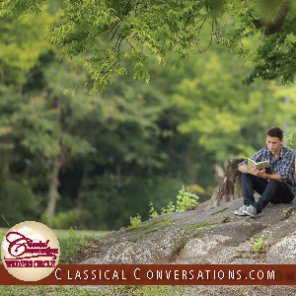Classical Conversations’ Challenge program is, in some ways, the hardest thing I’ve ever had to do in my life, short as it’s been. It wasn’t the homework that was hard, or the Latin quizzes. It wasn’t the classroom dynamic or the time management that was hard either. I think the hardest thing was the formation of my life into something harmonious. Of course, the things I listed could be—and were—difficult in their own rights, but it was the combining of each of those things in an orderly manner, the connecting them in more than a general, “these are all school subjects” way that I found most challenging.
Judging only by the way I thought during Challenge, I think I failed at harmony. I did my homework, I participated in class, I wrote my essays, and did all the other things that come with high school education. However, I don’t think I understood at the time the orderliness of what true classical education is. For me, literature was its own thing, as was math, philosophy, history, and laboratory. I didn’t understand how each of these studies were connected. I don’t mean how they were connected as school subjects, each focusing on a different aspect of God’s creation, nor do I mean how they were connected because they all fall under “liberal arts.” Both of these connections are true, and I noticed them, but what I mean is that I didn’t understand how they were connected in my own being, in my pursuit of becoming more human.
I now attend St. John’s college, and one of the peculiar things that happens here is that instead of end-of-year testing, we do something called a “don rag.” In a don rag, all my tutors from different subjects meet together and evaluate my year’s performance in each subject. They tell me what I’m doing well, and give me advice on how to improve. During my final sophomore year don rag, my music tutor said something that has stuck with me ever since: She said that I did very well in class, and she noticed that not only did I treat music as a subject to be learned in that particular classroom, but I tried to live musically throughout my whole life. She said that was what she wanted me to do with every class. She encouraged me to treat every study, every liberal art, with the same love and devotion I placed on music. Of course, that can be hard with something like Euclid’s geometry, but I think she was on to something. I think that’s what it means to connect each study in a harmonious way. It’s not simply a matter of understanding subjects’ connection in an intellectual way; subjects must be understood by my whole being. I must live classical education; I cannot simply learn it.
Now it’s okay for me to look back and say that I didn’t fully understand that during my time in the Challenge program. It wasn’t a failure in the sense that I didn’t pass a quiz. In fact, it wasn’t a failure at all; it was a “not quite yet.” Learning to live the classically educated life means learning to become more human, and do it well. It is an activity, something that I was trying to do, something that I am doing, and something that I will continue to do. There is always something more to discover, more to learn. There are more equations to solve, questions to ask, dissections to make, and books to fall in love with. And Challenge helped me with that. Its focus on classical education is exactly where one should begin, and what better place to grow from than the beginning?




